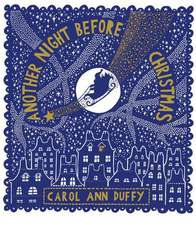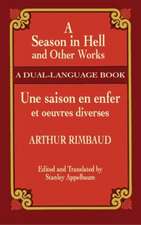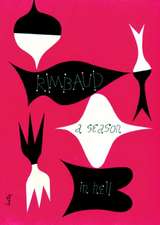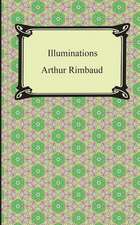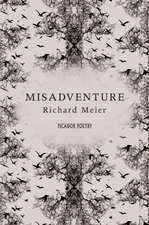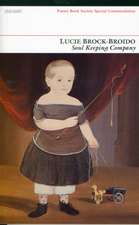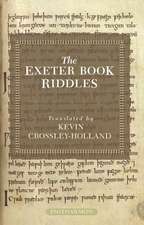A Season in Hell: European Writers
Autor Arthur Rimbaud Editat de Andrew Jaryen Limba Engleză Paperback – apr 2012
A new translation of Arthur Rimbaud's extraordinary poetic statement, written in 1873. The sensual, violent and anguished emotion in Rimbaud's visionary 'alchemy of the word' remains startling, and continues to inspire poets.
Printed with the French text facing the translation.
For a time, when he was a teenager until he was 19, art was crucial for the psychic well-being of the restless Arthur Rimbaud (1854-1891). The young would-be rebel Rimbaud escaped from the bland provincial town of Charleville in Northern France to wander the streets of Paris in poverty. After writing his Illuminations and A Season in Hell, some of the most extraordinary poems of all world literature, Rimbaud renounced it all for a hellish and apparently boring life in Aden. 'Mortel, ange ET demon, autant dire Rimbaud,' as Rimbaud's lover, Paul Verlaine wrote ('Mortal, angel AND demon, that is to say Rimbaud'.)
Arthur Rimbaud is the tornado of world poetry. He out-blasts just about every other poet. For poets, he is more significant than the so-called 'founding fathers' or influential philosophers of modern times: Marx, Freud, Nietzsche and Einstein. For poets, he is 'everybody's favourite hippy', a Communard, a 'precursor of the current movement of subversion of Western notions of self, society, and discourse', and a savage mystic.
Arthur Rimbaud is one of the most authentically rebellious of modern poets. Other poets have written of rebellion and radical action, but Rimbaud is one of the very few who actually carried it out (and didn't sound like an idiot when he spoke of it). Picture the young poet in his mid-teens, utterly bored by the living deaths of suburban life, aching to run away to Paris. Though he was dragged back a number of times, Rimbaud's life after his early teens was never again centred in his homeland. True, he returned to his mother, family and homeland, but his true heartland, his landscape of the soul, was elsewhere. Rimbaud was ever a poet of elsewhere, the other place, displacement. He was always another person: 'Je est un autre (I is an other).
He rebelled partly for the joy of rebellion. His early poetry is marked by an extraordinary virulence and anger. Illuminations and A Season in Hell, his major works, are also powered by an immense anger - a cosmic anger, a psycho-cultural-spiritual turmoil.
Illustrated, with a newly revised text for this edition. Introduction, bibliography and notes. ISBN 971861713605.
www.crmoon.com
| Toate formatele și edițiile | Preț | Express |
|---|---|---|
| Paperback (3) | 58.25 lei 3-5 săpt. | +6.56 lei 7-13 zile |
| Crescent Moon Publishing – apr 2012 | 58.25 lei 3-5 săpt. | +6.56 lei 7-13 zile |
| Crescent Moon Publishing – 16 mar 2020 | 77.91 lei 6-8 săpt. | |
| Crescent Moon Publishing – 4 dec 2022 | 108.81 lei 6-8 săpt. | |
| Hardback (1) | 173.59 lei 6-8 săpt. | |
| Crescent Moon Publishing – 30 apr 2012 | 173.59 lei 6-8 săpt. |
Din seria European Writers
-
 Preț: 124.02 lei
Preț: 124.02 lei -
 Preț: 100.55 lei
Preț: 100.55 lei -
 Preț: 84.96 lei
Preț: 84.96 lei -
 Preț: 117.57 lei
Preț: 117.57 lei -
 Preț: 77.91 lei
Preț: 77.91 lei -
 Preț: 87.14 lei
Preț: 87.14 lei -
 Preț: 194.18 lei
Preț: 194.18 lei -
 Preț: 350.98 lei
Preț: 350.98 lei -
 Preț: 157.56 lei
Preț: 157.56 lei -
 Preț: 103.81 lei
Preț: 103.81 lei -
 Preț: 198.59 lei
Preț: 198.59 lei -
 Preț: 67.74 lei
Preț: 67.74 lei -
 Preț: 126.51 lei
Preț: 126.51 lei -
 Preț: 106.59 lei
Preț: 106.59 lei -
 Preț: 103.05 lei
Preț: 103.05 lei -
 Preț: 108.57 lei
Preț: 108.57 lei -
 Preț: 175.88 lei
Preț: 175.88 lei -
 Preț: 120.61 lei
Preț: 120.61 lei -
 Preț: 76.77 lei
Preț: 76.77 lei -
 Preț: 91.62 lei
Preț: 91.62 lei -
 Preț: 88.28 lei
Preț: 88.28 lei -
 Preț: 120.61 lei
Preț: 120.61 lei -
 Preț: 120.46 lei
Preț: 120.46 lei
Preț: 58.25 lei
Nou
Puncte Express: 87
Preț estimativ în valută:
11.15€ • 11.67$ • 9.22£
11.15€ • 11.67$ • 9.22£
Carte disponibilă
Livrare economică 15-29 martie
Livrare express 01-07 martie pentru 16.55 lei
Preluare comenzi: 021 569.72.76
Specificații
ISBN-13: 9781861713605
ISBN-10: 1861713606
Pagini: 104
Ilustrații: black & white illustrations
Dimensiuni: 156 x 234 x 6 mm
Greutate: 0.16 kg
Ediția:4.
Editura: Crescent Moon Publishing
Seria European Writers
ISBN-10: 1861713606
Pagini: 104
Ilustrații: black & white illustrations
Dimensiuni: 156 x 234 x 6 mm
Greutate: 0.16 kg
Ediția:4.
Editura: Crescent Moon Publishing
Seria European Writers
Notă biografică
Arthur Rimbaud (1854-1891) was a visionary French poet from Charleville who dreamed of reinventing love and changing life with his poetry. At the age of sixteen, he traveled to Paris at the invitation of poet Paul Verlaine, ten years his senior, and exploded onto the literary scene with "The Drunken Boat." In the ensuing years, Rimbaud further confirmed his place in literature with the spiritual autobiography "A Season in Hell" (the only work Rimbaud had printed himself) and forty-four scintillating prose texts that were later published as "The Illuminations." As notorious for his life as he was for his poetry, Rimbaud had a productive but tumultuous relationship with Verlaine, who shot him in the wrist in Brussels. After abandoning literature at the age of twenty-one, Rimbaud enlisted in the Dutch colonial army in order to travel Java, deserting four months later and returning to France. In 1878, he traveled to Cyprus and worked as a foreman at a stone quarry. Two years later, he was living and working in Aden, Yemen, and then in Harar, Ethiopia, for an export agency. In 1885, he negotiated an arms deal with Menelik, the King of Shoa. A great walker all his life, Rimbaud developed a tumor in his right knee and soon returned to France in excruciating pain. His condition worsened, requiring doctors to amputate his right leg. Rimbaud died at the Hôpital de Conception in Marseille in 1891 at the age of thirty-seven; his body was returned to Charleville and buried in the Charleville-Mézières cemetery. Rimbaud's life and work have inspired countless writers, artists, and musicians, including the French Symbolists, the Beat generation, Bob Dylan, Patti Smith, and Jim Morrison.



